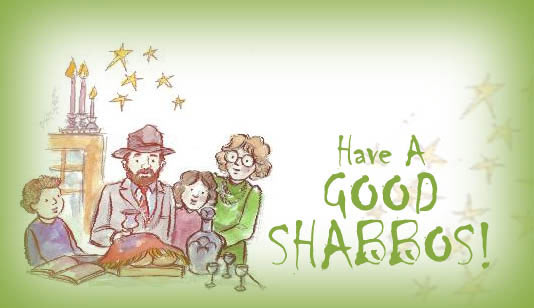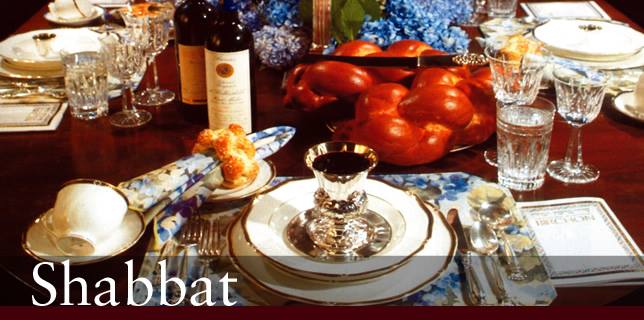There are some things that are hard to explain, because even though they may be highly intellectual, they are also very emotional experiences.

The holy day of Shabbos is one of those things. Shabbos is not merely a day of no work for us. It’s day of enjoyment, a day of delight, a day of holiness and joy. It’s our special day of close and personal relationship with Hashem.
Even though we are obligated to keep Shabbos, nevertheless it’s a joy to do so.
And moreover, it’s part of our personal and national contract with Hashem. Shabbos is the special “sign” between Hashem and His people Israel.
The Torah tells us:
God told Moses to speak to the Israelites and say to them: You must keep My Sabbaths. It is a sign between Me and you for all generations, to make you realize that I, Hashem, am
making you holy.— Exodus 31:12-13
What does it mean that Shabbos is a sign? How can there be a sign “between” people? What does it mean when the Torah says that Shabbos is a sign between Hashem and Israel?
Imagine that you walk one morning to your favorite candy store only to find, to your chagrin, that it is closed. There’s nothing you can do, so you simply hope they will be open tomorrow, and perhaps you’ll go somewhere else for today.
But when you return the next day, it’s still closed. “Oh, well,” you think, “the owner must be on vacation. I hope he’s not sick or anything like that.”
This could go on for a while, without you ever knowing for certain what has happened. As far as you know, the store is only temporarily closed and will reopen as soon as the owner either gets back from vacation or gets better or whatever the case may be.
But once the sign above the store is removed, the sign that says CANDY STORE, the sign you’ve looked for in delightful anticipation every day as you walked towards the store — once that sign is taken down, you know that the store is closed, and that it will never reopen.
Shabbos is the sign of a Jew. A Jew might at times falter, he might slip and slide and sin from time to time, but as long as he’s keeping Shabbos, you know that person is still attached to Judaism. Once a Jew stops keeping Shabbos, the Torah says that he has, Heaven forbid, officially severed ties with true Judaism. He has removed the sign that identifies the store. He has closed the shop.
Shabbos is a sign between Hashem and His people. It is part of our special and personal relationship with Hashem. It is part of our “contract” with Him.
And Shabbos is indeed so much like a candy store.
When someone keeps Shabbos properly, his face shines on Shabbos in a way that it doesn’t shine during the week. The delight that Jews experience on Shabbos is incomparable. It begins when we hurry to complete our preparations on Erev Shabbos (the day before Shabbos, i.e., Friday), steadily increases as we near Shabbos, reaches its peak on Shabbos itself, and remains in full force until Motza Shabbos (when Shabbos departs). And when we fully immerse ourselves in the experience of Shabbos, we feel this delight and holiness to a smaller degree throughout the week as well.
Like in the allegory above, we look forward to Shabbos all week. We long for it, and can hardly wait for it. Whatever we buy, we buy for the honor of Shabbos. We plan our entire week around Shabbos.
When we pray each morning we mention the importance of Shabbos in relation to each day of the week. On Sunday, we say “Today is the first day until Shabbos…,” On Monday, we say “Today is the second day until Shabbos…” and so on. On Shabbos, we say, “Today is the holy day of Shabbos…”
Shabbos is so much a part of who and what we are as Jews. It is the very heart of Judaism. The Torah itself equates it to all the Commandments of the Torah. The Torah says:
On the seventh day, some of the people went out to gather [food], but they found nothing. Hashem told Moses [to say to the Israelites], ‘How long will you refuse to keep My
Commandments and My Laws?— Exodus 16:27-28
The Israelites had not violated any other of the Commandments, yet the Torah asks why they refused to keep them. This is because violating the Shabbos is like violating not just the Commandment of Shabbos, but like violating all the Commandments.
This is because Shabbos is the sign of a Jew. If you remove the sign, where is the Jew?
The Midrash (Tamchuma Bereishis) says that honoring Shabbos is greater than keeping a thousand fasts.
The Talmud tells us that Hashem told Moses, “I have a good present in My treasure house, and its name is Shabbos. I want to give it to Israel. Go and tell them this” (BT, Shabbos 20b; Beitzah 16a).
Now Moses was required to teach the Children of Israel all about each and every Commandment that Hashem taught him. So why was Hashem telling him, “Go and tell them this?” What new thing is being said here?
The answer can be explained with a story told about a great Rabbi named Rabbi Shimon. A poor man came to his house to ask for charity, and he couldn’t find any money to give him. So instead he gave him a piece of jewelry, a ring that he thought might be worth a little money. “Here, take this and sell it,” he said. ”With the money you make, you can buy a little food.”
When his wife came home and found out what he had done, she got upset. “That ring was worth three hundred ruble! How could you just give it away?”
As soon as Rabbi Shimon heard this, he said, “Thank you for telling me that!”
He ran outside and chased after the man and told him, ”That ring is worth a lot of money! Make sure that you don’t get cheated!”
This is what Hashem was telling Moses. Hashem wanted Moses to explain to the Israelites what a valuable treasure Shabbos is, how special it is to Hashem, and how Hashem took it out of His treasure house especially for the Jews. This way, they would know the proper way to treat Shabbos, and how much honor to give it.
In order to know how much honor to give Shabbos, we must learn about it. We must learn how to appreciate it, and what each element of Shabbos means, and how it is to be treated.
Only then can we fulfill the words of the Prophet Isaiah, who said, “If you turn away your foot from traveling on Shabbos, and refrain from doing your affairs on My holy day, and you treat Shabbos like a delight, honoring Hashem’s holy day; if you honor it by not doing your business, attending to your affairs or speaking of weekday matters, then you will delight in Hashem. I will let you ride the heights of the earth and enjoy the inheritance of your forefather Jacob, for so has Hashem’s own mouth promised” (Isaiah 58:13-14).
In other words, if you teach yourself to experience Shabbos as a delight, you will be rewarded with the delight of Hashem Himself!
Come, give it a try.

